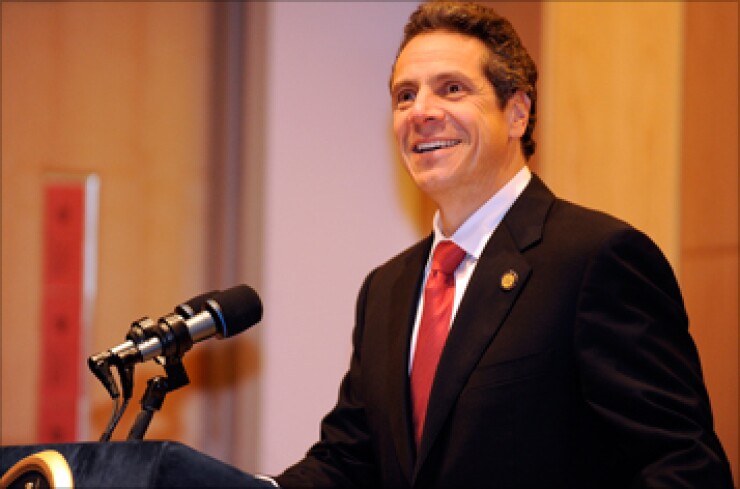
Three former chairmen of New York's Metropolitan Transportation Authority and other transit advocates Tuesday called on Gov. Andrew Cuomo and the state legislature to fully fund the MTA's proposed $32 billion capital program for 2015-2018.
"The governor and the legislature must do the heavy political lifting to fully fund the capital plan," said Lee Sander, who chaired the authority from 2007 to 2009.
Straining to speak above a cacophony of track announcements at the east end of Grand Central Terminal's upper concourse, Sander, Peter Stangl and Jay Walder conveyed a sense of urgency for New York's transit system.
The MTA's proposed plan, which is separate from the authority's operating budget, has a $15.2 billion funding gap. The Capital Program Review Board, consisting of Cuomo and other top state officials, rejected the plan in October without prejudice.
The authority is one of the largest municipal issuers, with roughly $35 billion of debt. According to Sander, MTA debt could reach $39 billion by 2018, twice what it had in 2003.
"Sometimes debt has been used excessively, though some debt is OK," said Sander, who is chairman of the Regional Plan Association and president of construction management group Haks Inc. "I'm concerned about more debt and higher fares."
Assemblyman Phillip Goldfeder, D-Queens, said skepticism abounds in the legislature.
"I think there's a lot of fear about continuing to put money into what amounts to a broken system," he said from Albany in an interview Tuesday. "I'm not saying the capital plan won't be funded, but people want to see results. My colleagues and I want to be thoughtful before we continue to write blank checks."
Goldfeder, a transit advocate who wants to restore the Rockaway Beach commuter line to provide north-south rail service in Queens, endorses the recommendations of the Transportation Reinvention Commission, a 24-member panel Cuomo convened to explore future MTA capital needs.
"I think the commission is a great step in trying to right the ship and provide real reform," he said.
While tussles between the MTA and Albany are periodic, the size of the proposed capital plan makes this one more significant, said Sander.
"It's a bigger number," he said.
Cuomo is scheduled to make a combined state of the state and budget address on Jan. 21. He suggested to reporters last fall that the MTA's plan might be "bloated," akin to many initial requests that reach his second-floor office upstate.
Richard Anderson, president of the New York Building Congress, said the transit needs are genuine.
"One common message is that we agree on the need for every one of those projects in the capital program," he said. "If anything, it should be $40 billion."
The group Tuesday danced around specific dedicated-revenue proposals, such as congestion pricing and the tolling of East River bridges.
"We didn't debate funding mechanisms because everyone had different viewpoints," said Gene Russianoff, an attorney and chief spokesman for the Straphangers Campaign subway ridership lobbying group.
Russianoff said the MTA should worry about debt service. "I don't know if they can borrow any more, because then it raises questions in the bond markets," he said.
Moody's Investors Service assigns an A2 rating to the authority's transportation revenue bonds, its primary credit. Fitch Ratings and Standard & Poor's rate them A and AA-minus, respectively.
The MTA's finance committee and full board are scheduled to vote on proposed fare and toll increases at next week's monthly board meetings.





